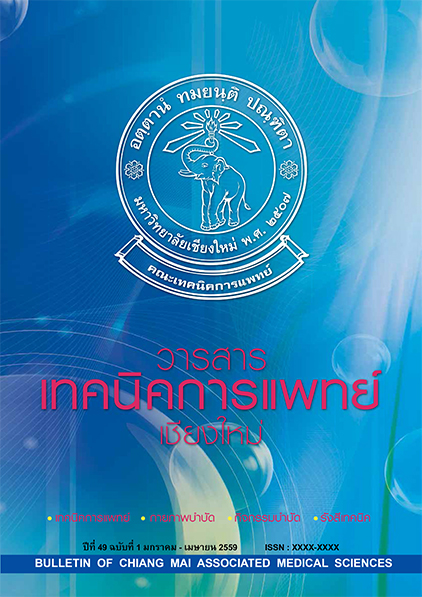Challenging trends of Medical Technologist toward health caring in the 21st century
Main Article Content
Abstract
In the digital era, a broad application of technologies considerably impacts routine life style that affects health status of global population. Concepts and strategies of health care system as well as roles of medical professionals have to be inevitably refashioned for prompt response to unceasing changes of social demands. A paradigm in medical technology has been shifted toward health promotion and prevention of diseases. The new concept emphasizes the significant role of medical technologist as a detective of human disorders, who initially notices imbalance or abnormality in the molecular levels through the laboratory results, thereby they should be the ones who bring awareness of individual healthcare to the community. In Thailand, the first community medical technology (community MT) project, which brought medical service to be accessible and affordable for more than 150 communities in Bangkok and surrounding provinces, has been launched by the Faculty of Medical Technology, Mahidol University since the year 1995. A success story of community MT is demonstrated by the honorable award of Prince Mahidol Award Conference (PMAC). The proactive role of medical technologists is also extended to educational sections in order to cultivate a new culture for the young generation. Currently, community-based learning is included as a compulsory course in the bachelor program in Medical Technology.
It is notable that an expectation regarding the potentials of medical technologists around the world has become beyond laboratory skills regarding dynamic changes of health status and social demands. From educational viewpoint, the curriculum should be remodeled to produce a new generation of medical technologists with high expertise and ethics to serve the society in the next 5-10 years. Additional skills such as data management skill, community practice, communication skill, interprofessional skill and collaborative practice should be included in the learning system. A capability to gain insights into highly advanced technologies and to apply them to the profession as well as an ability to develop novel innovations for diagnostic and therapeutic applications need to be cultivated. The moral and ethics, creativity and research skill should also be reinforced. A heart-based workforce and a capability to launch for new things should be emphasized through the form of transformative education. Regarding the era of standardization, the medical technology profession serve as a key person who plays crucial roles in an achievement of high standard healthcare system. The proactive role in community also takes part in successful control and treatment of diseases. The expectation with respect to standard skills of the new generation medical technologist has evoked us, as “medical technologists” and “teachers who nurture the new generation”, to address and support our professions toward successful mission of producing high potential and high moral offspring to fulfil the betterment of society.
Bull Chiang Mai Assoc Med Sci 2016; 49(1): 1-9. Doi: 10.14456/jams.2016.13
Article Details
Personal views expressed by the contributors in their articles are not necessarily those of the Journal of Associated Medical Sciences, Faculty of Associated Medical Sciences, Chiang Mai University.

